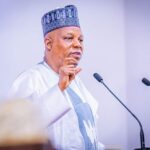President Bola Ahmed Tinubu scaled through the 2023 electoral hurdles to occupy Aso Rock Presidential Villa on the crest of his ‘Renewed Hope’ mantra that promised an improved living standard for Nigerians. Eight months into this administration, however, the opposite of the mantra has been the lot of the people; the pains and frustration among Nigerian citizens have been multiplied by the policies so far implemented.
This was the consensus among most of the speakers and discussants at the 21st Daily Trust Dialogue, held last Thursday in Abuja, with the topic ‘Tinubu’s Economic Reforms: Gainers and Losers’. Chaired by a former Minister of Finance, Budget and National Planning, Dr Shamsudeen Usman, the main speakers at the event included the President of the Nigerian Labour Congress (NLC), Comrade Joe Ajaero, and a former Director-General of the Abuja Chamber of Commerce and Industry (ACCI), Dr Victoria Akai. The third speaker and Minister of Finance & Coordinating Minister for the Economy, Mr Wale Edun, failed to honour the invitation.
It is obvious that little risk analysis was conducted before Tinubu announced the removal of subsidy on petroleum products in May 2023. The increase in the prices of petrol plunged citizens into difficulties associated with the high cost of transportation and many locally produced goods. The second measure, the attempt to abridge the official and black-market rate of foreign exchange, a euphemism for the drastic devaluation of the naira in an unbelievable proportion, created hyper-inflation that caused the cost of common goods to hit the roof.
Worse still, local industries which cannot raise the quantum of naira needed to purchase foreign exchange at the new rates, grew very lean, and some have fizzled out of business. These have grave implications for the survival of citizens and the general health of the economy. No doubt, Tinubu’s economic policies so far have made the citizens the clear losers.
- FAAN, CBN’s relocation aimed at reducing operational costs – FG
- FG tasked on sustainability of pediatric HIV programmes
On the other hand, the three tiers of government are gainers from the policies, as more cash is shared among them every month at the Federal Account Allocation Committee (FAAC) meetings. Instead of distributing the excess cash through increase in salaries, providing and subsidising social services, and the promised palliative measures, those who manage the three tiers of government play the ostrich, thinking that citizens would adapt to the difficult dispensation as irreversible realities.
The purpose of government is not to create difficulties for the people who vote it into power, it is to create the enabling environment for better living conditions for the citizenry. Government is meant to provide social services, security, and create an atmosphere conducive to prosperity. The Tinubu administration cannot abdicate this responsibility; it must respond to the outcries across the country over its policies.
It is not clear to the people the kind of economic system being pursued by this government, apart from its apparent romance with Bretton Woods institutions – the World Bank and the International Monetary Fund (IMF). However, indices that say the economy shall grow by 3.3 per cent, against the previous projection of 2.9 per cent; and oil production has increased by some 9.16 per cent, means, on the average, the country exports more than one million barrels of crude oil per day; and the proposed decentralisation of the electricity generation and distribution, may have long-term positive effects on the economy. Those effects may take too long in coming for the kind of immediate and urgent measures needed to cushion the effects of the poorly dissected policies on the people.
During the election, this government promised a better tomorrow, better than the previous administration. But too early in the day, the reverse or a bitter measure is being dished out to the people.
The government must take several urgent steps to curtail the current predicament. First, the devaluation of the naira, from about N700/$ in May 2023 to about N1,400/$ in a space of eight months cannot stand. Even the Central Bank Governor, Mr Yemi Cardoso, admitted last week that the naira was undervalued.
The Tinubu administration must put in place all the monetary policies necessary to enhance the value of the naira. Also, it has become imperative for the government to probe those who mop up the United States dollars from the Bureaux de Change across the country. The administration must urgently put in place fiscal measures that will boost local manufacturing as the cost of importing finished goods has skyrocketed. There are dual advantages of doing so. First, it will reduce the cost of goods. Secondly, a boost in the manufacturing sector will lead to employment for our youths.
The government should tackle insecurity, which makes agricultural production difficult and discourages Foreign Direct Investment. Also, the double-digit inflation cannot help the economy. Most governments that have come to power in Nigeria claimed to have good intentions for the people; but ended up worsening the living conditions of the people. Tinubu must not make the same mistake.

 Join Daily Trust WhatsApp Community For Quick Access To News and Happenings Around You.
Join Daily Trust WhatsApp Community For Quick Access To News and Happenings Around You.


